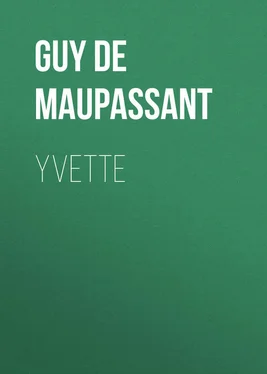Guy Maupassant - Yvette
Здесь есть возможность читать онлайн «Guy Maupassant - Yvette» — ознакомительный отрывок электронной книги совершенно бесплатно, а после прочтения отрывка купить полную версию. В некоторых случаях можно слушать аудио, скачать через торрент в формате fb2 и присутствует краткое содержание. Жанр: literature_19, foreign_antique, foreign_prose, на английском языке. Описание произведения, (предисловие) а так же отзывы посетителей доступны на портале библиотеки ЛибКат.
- Название:Yvette
- Автор:
- Жанр:
- Год:неизвестен
- ISBN:нет данных
- Рейтинг книги:4 / 5. Голосов: 1
-
Избранное:Добавить в избранное
- Отзывы:
-
Ваша оценка:
- 80
- 1
- 2
- 3
- 4
- 5
Yvette: краткое содержание, описание и аннотация
Предлагаем к чтению аннотацию, описание, краткое содержание или предисловие (зависит от того, что написал сам автор книги «Yvette»). Если вы не нашли необходимую информацию о книге — напишите в комментариях, мы постараемся отыскать её.
Yvette — читать онлайн ознакомительный отрывок
Ниже представлен текст книги, разбитый по страницам. Система сохранения места последней прочитанной страницы, позволяет с удобством читать онлайн бесплатно книгу «Yvette», без необходимости каждый раз заново искать на чём Вы остановились. Поставьте закладку, и сможете в любой момент перейти на страницу, на которой закончили чтение.
Интервал:
Закладка:
Guy de Maupassant
Yvette
CHAPTER I
THE INITIATION OF SAVAL
As they were leaving the Cafe Riche, Jean de Servigny said to Leon Saval: "If you don't object, let us walk. The weather is too fine to take a cab."
His friend answered: "I would like nothing better."
Jean replied: "It is hardly eleven o'clock. We shall arrive much before midnight, so let us go slowly."
A restless crowd was moving along the boulevard, that throng peculiar to summer nights, drinking, chatting, and flowing like a river, filled with a sense of comfort and joy. Here and there a cafe threw a flood of light upon a knot of patrons drinking at little tables on the sidewalk, which were covered with bottles and glasses, hindering the passing of the hurrying multitude. On the pavement the cabs with their red, blue, or green lights dashed by, showing for a second, in the glimmer, the thin shadow of the horse, the raised profile of the coachman, and the dark box of the carriage. The cabs of the Urbaine Company made clear and rapid spots when their yellow panels were struck by the light.
The two friends walked with slow steps, cigars in their mouths, in evening dress and overcoats on their arms, with a flower in their buttonholes, and their hats a trifle on one side, as men will carelessly wear them sometimes, after they have dined well and the air is mild.
They had been linked together since their college days by a close, devoted, and firm affection. Jean de Servigny, small, slender, a trifle bald, rather frail, with elegance of mien, curled mustache, bright eyes, and fine lips, was a man who seemed born and bred upon the boulevard. He was tireless in spite of his languid air, strong in spite of his pallor, one of those slight Parisians to whom gymnastic exercise, fencing, cold shower and hot baths give a nervous, artificial strength. He was known by his marriage as well as by his wit, his fortune, his connections, and by that sociability, amiability, and fashionable gallantry peculiar to certain men.
A true Parisian, furthermore, light, sceptical, changeable, captivating, energetic, and irresolute, capable of everything and of nothing; selfish by principle and generous on occasion, he lived moderately upon his income, and amused himself with hygiene. Indifferent and passionate, he gave himself rein and drew back constantly, impelled by conflicting instincts, yielding to all, and then obeying, in the end, his own shrewd man-about-town judgment, whose weather-vane logic consisted in following the wind and drawing profit from circumstances without taking the trouble to originate them.
His companion, Leon Saval, rich also, was one of those superb and colossal figures who make women turn around in the streets to look at them. He gave the idea of a statue turned into a man, a type of a race, like those sculptured forms which are sent to the Salons. Too handsome, too tall, too big, too strong, he sinned a little from the excess of everything, the excess of his qualities. He had on hand countless affairs of passion.
As they reached the Vaudeville theater, he asked: "Have you warned that lady that you are going to take me to her house to see her?"
Servigny began to laugh: "Forewarn the Marquise Obardi! Do you warn an omnibus driver that you shall enter his stage at the corner of the boulevard?"
Saval, a little perplexed, inquired: "What sort of person is this lady?"
His friend replied: "An upstart, a charming hussy, who came from no one knows where, who made her appearance one day, nobody knows how, among the adventuresses of Paris, knowing perfectly well how to take care of herself. Besides, what difference does it make to us? They say that her real name, her maiden name – for she still has every claim to the title of maiden except that of innocence – is Octavia Bardin, from which she constructs the name Obardi by prefixing the first letter of her first name and dropping the last letter of the last name."
"Moreover, she is a lovable woman, and you, from your physique, are inevitably bound to become her lover. Hercules is not introduced into Messalina's home without making some disturbance. Nevertheless I make bold to add that if there is free entrance to this house, just as there is in bazaars, you are not exactly compelled to buy what is for sale. Love and cards are on the programme, but nobody compels you to take up with either. And the exit is as free as the entrance."
"She settled down in the Etoile district, a suspicious neighborhood, three years ago, and opened her drawing-room to that froth of the continents which comes to Paris to practice its various formidable and criminal talents."
"I don't remember just how I went to her house. I went as we all go, because there is card playing, because the women are compliant, and the men dishonest. I love that social mob of buccaneers with decorations of all sorts of orders, all titled, and all entirely unknown at their embassies, except to the spies. They are always dragging in the subject of honor, quoting the list of their ancestors on the slightest provocation, and telling the story of their life at every opportunity, braggarts, liars, sharpers, dangerous as their cards, false as their names, brave because they have to be, like the assassins who can not pluck their victims except by exposing their own lives. In a word, it is the aristocracy of the bagnio."
"I like them. They are interesting to fathom and to know, amusing to listen to, often witty, never commonplace as the ordinary French guests. Their women are always pretty, with a little flavor of foreign knavery, with the mystery of their past existence, half of which, perhaps, spent in a House of Correction. They generally have fine eyes and glorious hair, the true physique of the profession, an intoxicating grace, a seductiveness which drives men to folly, an unwholesome, irresistible charm! They conquer like the highwaymen of old. They are rapacious creatures; true birds of prey. I like them, too."
"The Marquise Obardi is one of the type of these elegant good-for-nothings. Ripe and pretty, with a feline charm, you can see that she is vicious to the marrow. Everybody has a good time at her house, with cards, dancing, and suppers; in fact there is everything which goes to make up the pleasures of fashionable society life."
"Have you ever been or are you now her lover?" Leon Saval asked.
"I have not been her lover, I am not now, and I never shall be. I only go to the house to see her daughter."
"Ah! She has a daughter, then?"
"A daughter! A marvel, my dear man. She is the principal attraction of the den to-day. Tall, magnificent, just ripe, eighteen years old, as fair as her mother is dark, always merry, always ready for an entertainment, always laughing, and ready to dance like mad. Who will be the lucky man, to capture her, or who has already done so? Nobody can tell that. She has ten of us in her train, all hoping."
"Such a daughter in the hands of a woman like the Marquise is a fortune. And they play the game together, the two charmers. No one knows just what they are planning. Perhaps they are waiting for a better bargain than I should prove. But I tell you that I shall close the bargain if I ever get a chance."
"That girl Yvette absolutely baffles me, moreover. She is a mystery. If she is not the most complete monster of astuteness and perversity that I have ever seen, she certainly is the most marvelous phenomenon of innocence that can be imagined. She lives in that atmosphere of infamy with a calm and triumphing ease which is either wonderfully profligate or entirely artless. Strange scion of an adventuress, cast upon the muck-heap of that set, like a magnificent plant nurtured upon corruption, or rather like the daughter of some noble race, of some great artist, or of some grand lord, of some prince or dethroned king, tossed some evening into her mother's arms, nobody can make out what she is nor what she thinks. But you are going to see her."
Читать дальшеИнтервал:
Закладка:
Похожие книги на «Yvette»
Представляем Вашему вниманию похожие книги на «Yvette» списком для выбора. Мы отобрали схожую по названию и смыслу литературу в надежде предоставить читателям больше вариантов отыскать новые, интересные, ещё непрочитанные произведения.
Обсуждение, отзывы о книге «Yvette» и просто собственные мнения читателей. Оставьте ваши комментарии, напишите, что Вы думаете о произведении, его смысле или главных героях. Укажите что конкретно понравилось, а что нет, и почему Вы так считаете.












